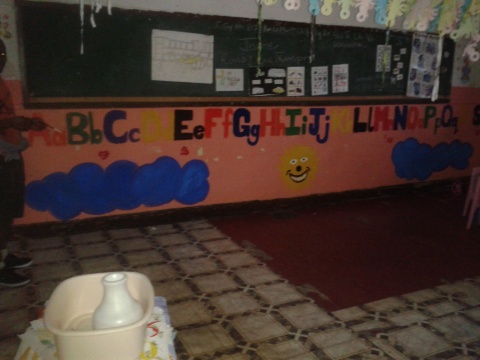
Wednesdays is usually Homework Sessions at our Vuyani Nkosi Memorial Youth Centre but all that changed for Mandela Day, where we dedicated 67 minutes of our usual 2 hour sessions to giving back once again to the community. The overarching objective of Mandela Day is to inspire individuals to take action to help change the world for the better. Well with the future in their hands, this is what IY’s Chesterville learners had in mind for their Mandela Day.
18 July ( Nelson Mandela’s birthday ofcourse ) saw Chesterville learners, staff and tutors return to the St Anthony’s Church’s Mission in a quest to not only finish painting a class we had painted during winter school but also brighten up another class we had been permitted to paint and this time it was in honour of our first democratically elected president, Nelson Rolihlahla Mandela who was turning 94
St. Anthony’s Church has a mission which houses abused women and children. Mothers who live at the mission with their toddlers, have the pleasure of having their young ones attend a pre-school located in the premises of the church. These 2 classes are separated – one being for infants and toddlers while the other is for grade 0 learners.
having been the first black president in 1994.
Read a snippet about the event on the official Mandela Day site.
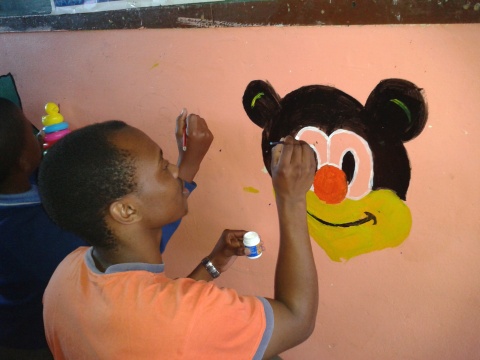
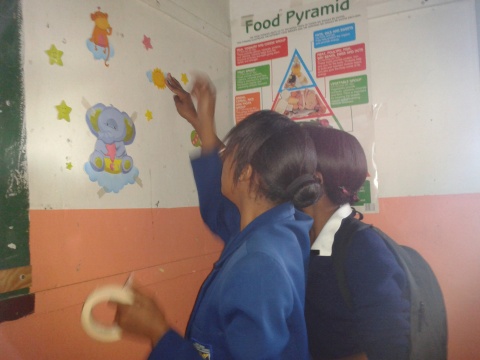
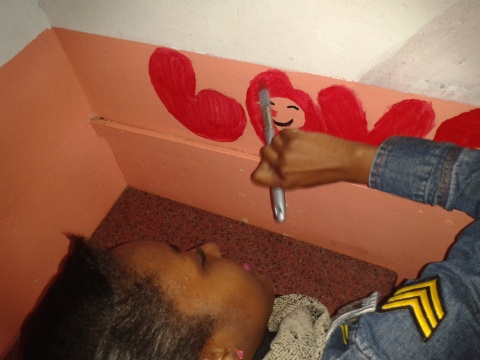
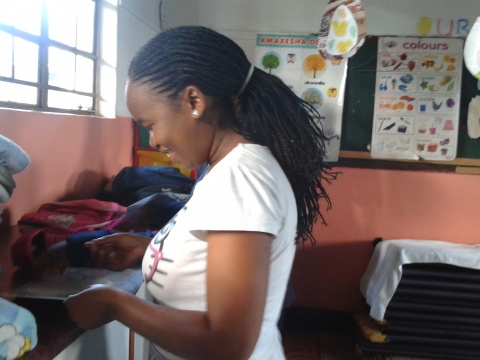
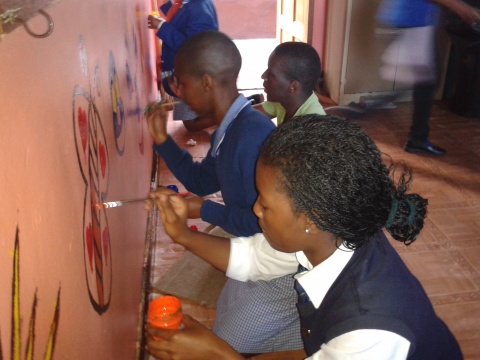
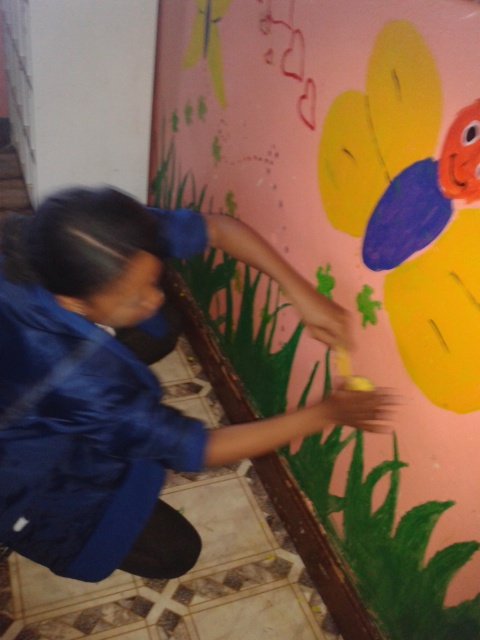
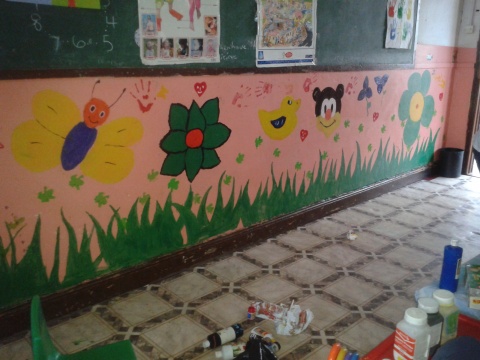
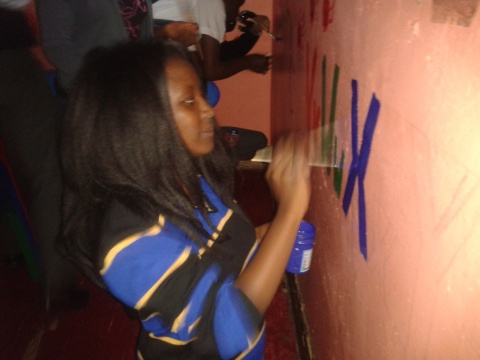
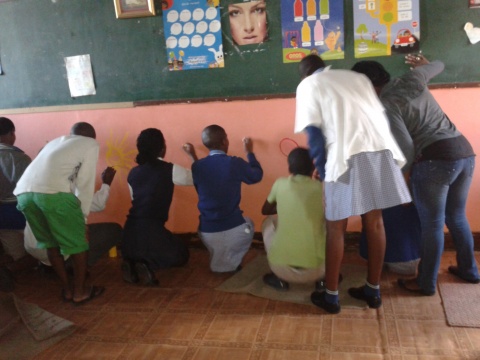

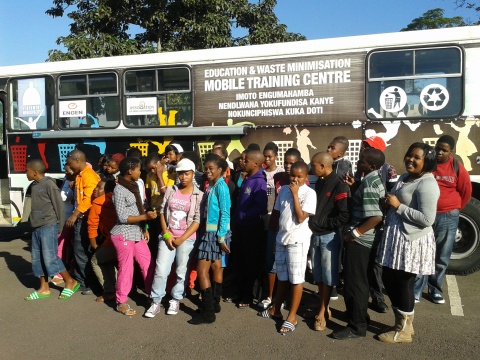
Some day we may be mining our landfills for the resources we’ve buried. A scary fact presented to the learners of IY’s Chesterville on their Operation Clean Up which was
held on the morning of Thursday, 28 June.
This was a new initiative piloting in Winter School in an aide to get our learners to give
back to the community that they’ve grown up in ( majority if our learners either attend
school within the Chesterville area and/or live within the area – or surroundings )
Durban Solid Waste and Ethekwini Municipality’s Parks and Recreation played a
major role in making this day possible. Thursdays activities started with the learners
taking a walk through the Education & Waste Minimisation Mobile Training Centre –
a bus which travels around various schools and communities within the municipalities
educating society about waste management and recycling through joint collaborations
between the municipality, Engen and the Association of Waste Management.

Mr Njebo, who is in KwaZulu Natal’s head office of Waste Management delivered a talk
about recycling and gave learners ideas on household waste they can recycle.
After all this, learners and tutors were separated into various groups and it was time to
walk around Chesterville to help clean up the community. DSW kindly sponsored gloves
as well as plastic bags which we would use to collect all the waste we found along our
way.
Our first stop was the local hospice where learners cleaned outside the premises, the yard
and gardens. Thereafter we took a walk down towards the St Anthony’s Church’s mission amidst
the support and cheers of local community members.

Arriving at the mission, we were greeted by a Parks and Recreation truck which was
there to deliver the tools sponsored by the department which would be used to clean up
the yard.
Once again learners were separated into groups and cleaned around the yard of the
mission as well as clearing the yard of weeds.
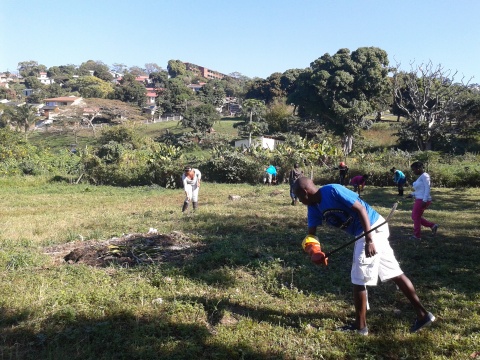
Learners enjoyed clearing up the garden and we are looking forward to hopefully return
to plant a few vegetables for the abused and abandoned women and children which this
mission houses.
After our Operation Clean Up, Chesterville learners returned to DUT for academic
tutoring. At this time, Umlazi learners, who had started the morning in the classroom,
began their Operation Clean Up with a presentation from Zanele, from the DSW
education department. The presentation focused on various aspects such as awareness of
pollution, waste management, different disposal areas in KZN and what effect waste has
on the environment.
Zanele futher empasised the importance of “the 3 Rs” (Reduce, Re-use, Re-cycle), in
combating the negative impact waste has on the environment.
Another important aspect which they touched on was the illegal dumping of waste
especially by our households when they miss the scheduled time of the municipal truck
picking up waste in the neighborhood.
After the insightful presentation, learners were taken to the beach, not to swim, but to
give back to their environment, by cleaning up the litter in the area.
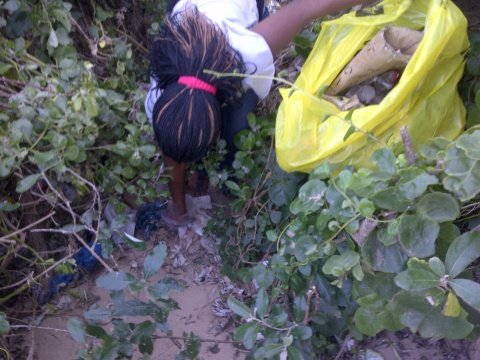
Having Joy Olivier ( co-founder of IkamvaYouth ) and Zamo Shongwe ( IY’s National Coordinator ) join
The clean-up was an added treat for the learners. The amount of litter collected in the
few minutes that the learners were there (just under 30 minutes) was a real eye opener.
Learners really got to see just how bad the issue of pollution on our beaches actually is.
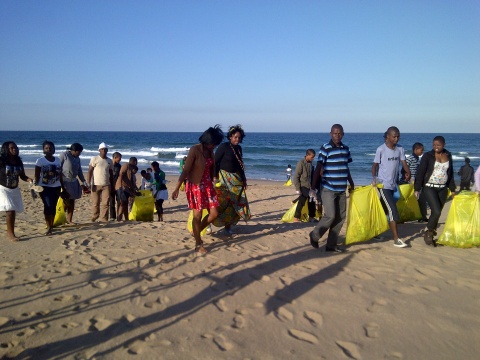
We hope that this is the start of a great initiative and that learners will be able to use all
the knowledge that they gained about taking care of their environment, within their daily
lives.
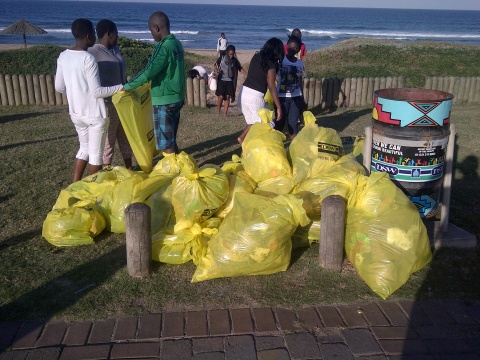
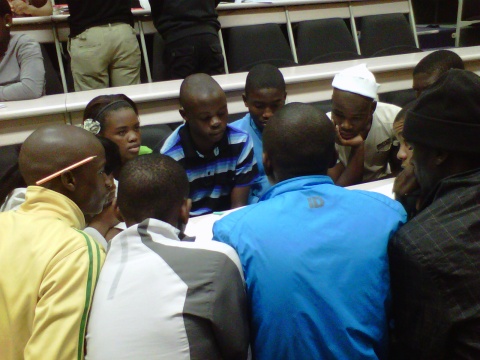
The hallway was buzzing and excitement filled the air as learners from Umlazi and Chesterville branches gathered outside Durban University of Technology’s ( DUT) passages of the library basements.
It was a mixture of old and new learners as well as old and new tutors all waiting in anticipation for the official start of Winter School. With the first half of the day dedicated to academic/tutoring activies and the latter to activities, fun and learning were definitely on the cards for the week.
This was the perfect opportunity to introduce our Reading Corner initiative, the brainchild of our Branch Assistant Cheryl Nzama. Having collected books from friends as well as a generous loan by the Umlazi AA Library ( where IY Umlazi is based ) we had a large box of books to spread amongst all learners from both branches. The aim of our book corner is not only to get learners interested in reading but also to enhance their English reading and writing skills.

Tuesday saw the arrival of the Answer Series books which IY learners over the years have used during Homework and Saturday Sessions as well as for preparation for exams. All this is possible through the kind sponsorship of The Answer , who provide these study guides for all our learners across the grades.
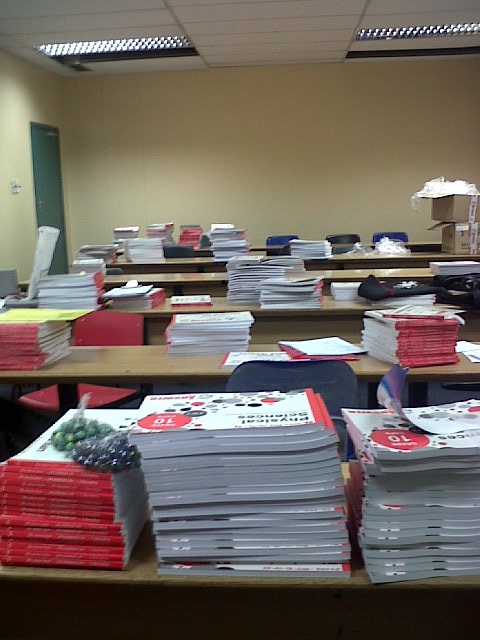
A lot of Grade 11 IY learners count Wednesday as their favourite day week 1. This is because Durban University of Technology‘s Chemistry lab ( through the assistance of senior Lecturer and Lab Assistant Mr Roy Nursagh donated half of the morning ( and some of their staff members ) towards doing various Chemistry practicals with learners – a great fete as most learners are in schools who are not equipped with Chemistry labs and only depend on their textbooks to study. Learners had the chance to do four different experiments as well as watch a presentation by Mr Roy for two other experiments.
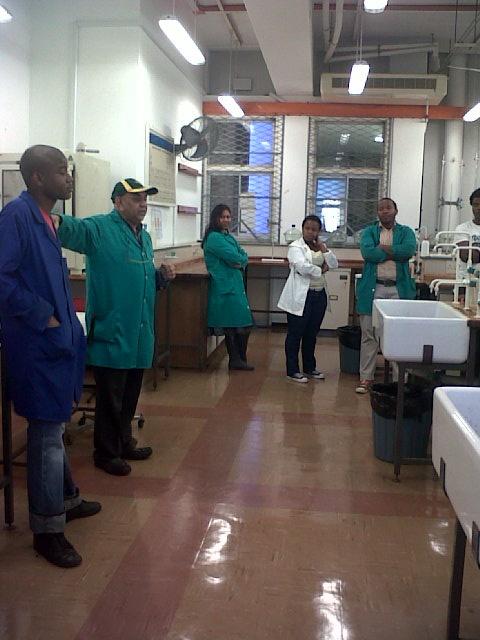
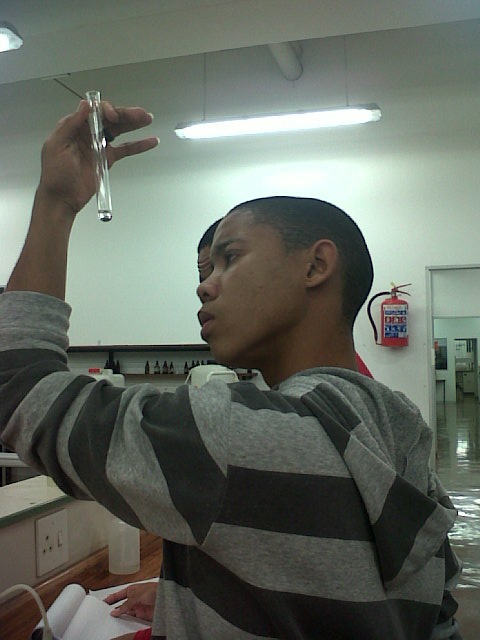
The two branches went their separate ways on Thursday for Operation Clean Up, an initiative aimed at encouraging environmental awareness and offering the learners an opportunity to back to their environment . Early in the morning Chesterville learners met up at the Vuyani Nkosi Memorial Centre where IY Chesterville is based and cleaned up the Chesterville Hospice, the main road ( Mahlathi Road ) as well as the St Anthony’s Church’s Mission which houses old aged as well as abused women and children.
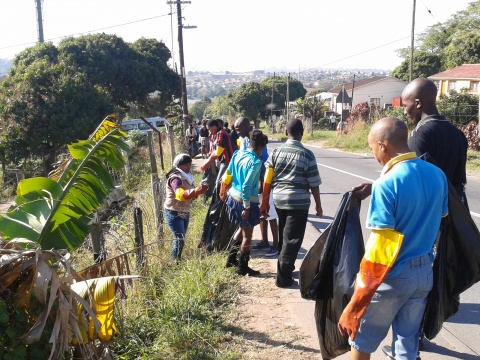
Through the assistance of Chesterville’s Area Based Management ( ABM ), Durban Solid Waste ( DSW ) donated plastics, gloves as well as an Environmental Bus and guest speaker for the event was Mr Njeba while Ethekwini Municipality’s Parks, Recreation and Culture donated tools used to clean up the yard. Both companies were also kind enough to sponsor 2 trucks and 4 municipal workers that picked up the litter collected by learners as well as the rubble from the mission.
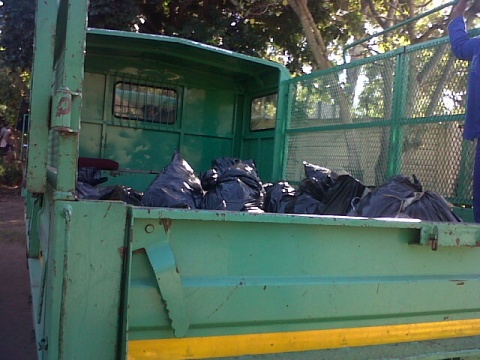
Friday, learners were combined and then separated into 4 groups : Yellow, Green, Blue and Red which were The Peacemakers, Ingqungqulu, Blue Bullz and Umlilo respectively.
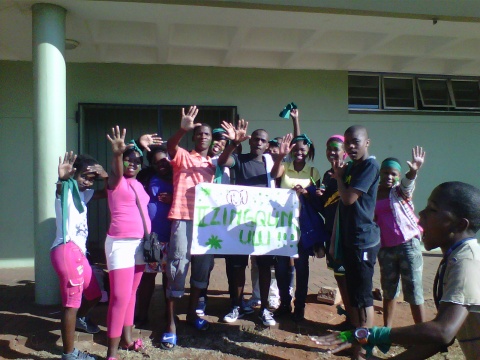
This was for our set to be annual event : Sports Day, an idea brought about by our Umlazi Branch Coordinator S’bonelo Cele.
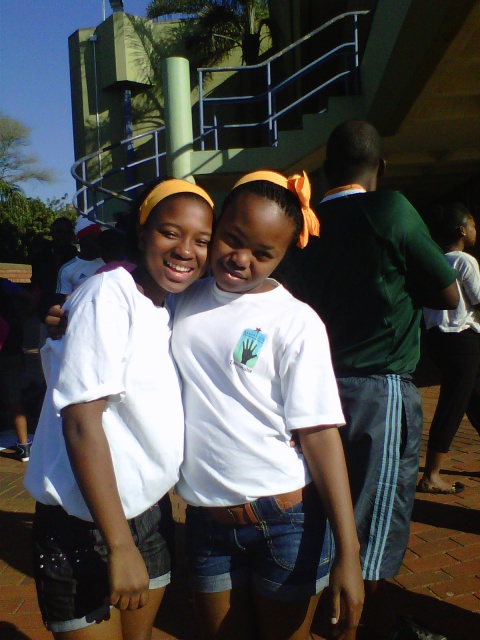
Various games such as Soccer, Netball as well as 100m, 400m and 400m Relay races and indigenous games such as Hopscotch, Amagende, Sprite and uShumpu were played and saw The Peacemakers ( Yellow ) walk away as the official winners of the event having collected the most points. ABI were the proud sponsors of this event which they also dubbed their CSI Day. Read more about the day here.


Having begun in 2003 in Sinako High School in Khayelitsha, initiated by Joy Olivier and Makhosi Gogwana, IkamvaYouth now has 7 branches in 3 provinces across South Africa. Over these 9 years, we have touched the lives of thousands of learners, parents, teachers, tutors and staff.
#WhereAreTheyNow takes an indepth look at the lives of individuals whose lives have crossed with IkamvaYouth and the changes this brought about.
New faces join us every year and old faces make an appearance every now and then.
With this series of blogs and biographies, we introduce you to all those that believe we made a difference in their lives and those that return to be the difference. We also honour those who have helped IkamvaYouth grow and moved on to other pastures.
In our first interview, we take a look at the life of Buhlebakhe Ngongoma , a return tutor based at our Chesterville branch. He joined IY when it first begun in KZN in 2007 and is now preparing for his Board Exams while studying for his BCom Accounting at UKZN’s Pietermaritzburg Camp.
Take a look at the full biography here .
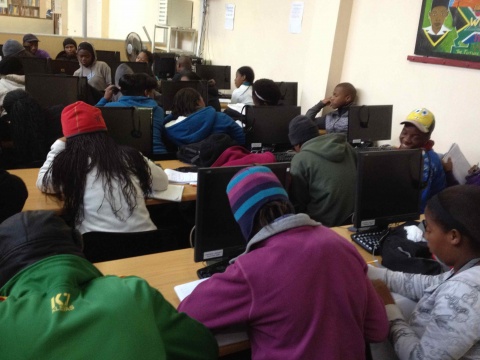
While all the Makhaza students enjoy the last week of their winter school holidays, taking a much needed break from the intense focused energy needed for winter school, the Western Cape matrics have given up their entire holiday to continue with tutoring, mentoring, exam preparation, and tertiary applications.
This week sees intensive academic writing and bursary application writing workshops being run by Rose and Francisca, two volunteers from Stanford university, as well as each matric filling out at least 5 application forms for tertiary. It’s only Wednesday and so far everyone has applied for UCT, TSiBA, UWC, CPUT, Northlink and a few for Stellenbosch University. All this interspersed with tutoring, tutoring and more tutoring (with the odd test thrown in..)
Big up matrics!! The end is nearly in sight, by giving up your holiday for this last gasp of intensive tutoring and mentoring it’s setting yourself up for a spectacular finish at the end of the year!
There are only a few days left, if you are interested in tutoring or mentoring the matrics, please email liesel@ikamvayouth.org, alternatively call Zukile on 021 362 6799

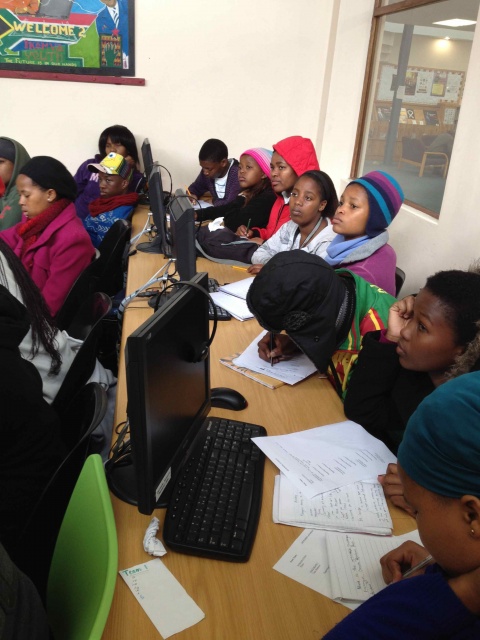
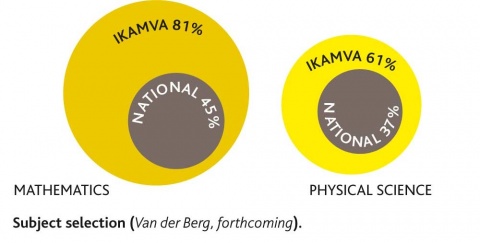
IkamvaYouth is pleased and proud to announce the publication of Against the odds: An evaluation of the IkamvaYouth programme, by a team of economists at the University of Stellenbosch. Servaas van der Berg and his team conducted an in-depth evaluation of IkamvaYouth, by administering questionnaires and interviewing 828 ikamvanites (past and present).
The full report is available here for download, and contains a wealth of information, results, analysis, quotes from ikamvanites and recommendations for improvements and scale.
Some of the findings have validated the results we’ve reported via our own tracking (see below). However, there were also some new and interesting findings, including:
- Insight into ikamvanites’ wealth and living standards
- Only 38% of ikamvanites live with their parents; 45% sometimes go to bed hungry; only 31% have their own desk or table at home and 65% have their own bed.
- 22% of mothers have matric and 11% have some post schooling
- 15% of fathers have matric and 9% have some post schooling; 32% of fathers’ education levels are unknown
- Matric results as compared with those of our feeder schools
- Detail regarding learners’ choosing Maths and Science and their performance in these most-challenging subjects
- “An overwhelming majority (81%) of Ikamva students in 2011 elected to do Mathematics, versus less than half of all candidates nationally. For Physical Science too, far more Ikamvanites chose this difficult option. Reponses to the survey indicate that similarly high proportion of former Ikamva students had elected these two subjects: 78% wrote Mathematics and 54% Physical Science.”
- “The difficulty of these subjects can be gauged from the fact that nationally, the pass rate (at 30%) is 46% and 53% for these two subjects respectively, much lower than for other electives such as Geography (70%) or History (76%), despite the fact that the candidates in these first two subjects are a far more select group in terms of academic ability. This ambitious subject choice is even more exceptional when compared to learners from similar (mainly township) schools. Ikamva’s encouragement of learners to take these more difficult subjects necessarily affects the relative pass rates and the subject performance of Ikamva learners negatively, thus the need to carefully consider this when evaluating Ikamva learners’ results.”
- “61% of all Ikamva matric candidates wrote and passed Mathematics, as against only 21% for all South African matric candidates.3 The proportion of all Ikamva matric candidates who achieved 40% or more was 28% versus 14% for all South African candidates. Compared to similar communities the Ikamva performance in this regard would even be more impressive than this.”
- ” What Ikamva thus successfully manages to do is to encourage learners from across the ability spectrum to raise the bar, by entering for subjects which the typical student from weak schools would usually avoid, and then to achieve success which is at least comparable to that achieved by candidates that often are more selected in terms of ability and from higher socio-economic groups. This is a truly impressive achievement.”
- The good results are consistent: “average results differ little between branches”
- The programme is very highly regarded by our learners and ex-learners (they do tell us these things, but it means a great deal more when told to independent evaluators)
- “The evaluation team is confident that Ikamva’s short term impact is considerable. This lies not only in the improved matric performance, but even before that in helping to create an environment where children from often very disadvantaged circumstances feel a sense of belonging and that someone cares about their needs and ambitions. That alone is a very valuable contribution. The extent of this contribution cannot be measured, but is visible in the fact that Ikamva was so highly praised by all who participates in it, or have done so in the past. As an evaluation team we have not seen such universally high praise of an organisation before.”
- Insight into the “success factors” behind the IY model
- “The remarkably successful personal relationships that Ikamva has developed with participants, based on extremely sensitive interaction with learners, yet without undermining basic discipline: “Kickouts” still occur and learners know that they can only remain part of the “family” if they play their part.”
- The tutors: “They are largely volunteers and mostly young. The fact that many of them are former Ikamvanites say something about the glue that holds Ikamva together: A positive social context in an environment where many face harsh circumstances at home, in the labour market, schools, universities, and wider society. The link with Ikamva means much to them, and also provides some continuity in their lives. Also, they act as role models to learners, thus further strengthening the desire of learners to undertake tertiary studies. Their relative youth also means that communication with learners is easier, in contrast to what learners experience at school. The team found no evidence that the tutors were particularly well trained or that they were always much better teachers than those in schools; the commitment, positive interaction and additional time were apparently most important in the success of students, not the better teaching.”
- “The fact that Ikamva operates in metropolitan environments where there are universities close by is an important factor in its success. Without a strong volunteer base, the tutors would not have been available, and it would have been more difficult to build the passion for tertiary studies that drives many Ikamvanites.”
- “The most important factors in Ikamva’s success, however, appear to be its commendable organisation, good planning and the enthusiasm of those at the head of the organisation. This enthusiasm is contagious.”
- Matric results
- “85% of Ikamva candidates passed, against the 70% nationally, or put differently, that Ikamva’s failure rate of 15% was half of the national average. But the full extent of Ikamva’s performance success is not yet captured in simple pass or fail rates: What is quite impressive is Ikamva’s performance in terms of getting learners access to universities: 36% of Ikamva candidates, versus 24% nationally, obtained a so-called “Bachelor’s degree endorsement”, i.e. a pass that is considered by the Department of Basic Education as good enough for degree studies. This is what used to be referred to in the past as “university exemption”. Data on a race basis is not yet available for 2011, but to put the Ikamva performance in terms of potential university entry in perspective, it is worth considering that the proportion of black students who obtained such exemptions in 2007, the last year for which race data could be obtained, was only around 11%. Altogether 72% of Ikamva candidates passed with either Bachelor’s or a Diploma endorsement, i.e. could potentially attend a university for degree or diploma studies (some universities have stricter entry criteria, though), whilst this proportion is only 53% amongst matric candidates nationally.”
- Placement into post-school opportunities
- More than half of respondents who had matriculated whilst participating in Ikamva after matriculating (58% of the 119 such respondents in the survey) indicated that they had gone onto university studies, and another 14% that they had continued onto “college” (here interpreted fairly broadly as other post-school studies). This thus left only 28% who had not gone on to further studies.
Key recommendations which we’re currently considering carefully include:
- Find ways to support learners as they adjust to life at tertiary
- “Ikamva could, and should, find ways of assisting students to make the transition to university, both by assistance with the initial exposure to academic English that many respondents to the qualitative interviews found daunting, and by helping them to find support structures to reduce the anomy that they experience when starting at university. Ikamva would have to decide how much of this it wants to engage in itself (which is not its core activity), and how much can be done by assisting Ikamvanites to link to other institutions (e.g. NGOs and university structures) that could assist.”
- Provide more support to build proficiency in Academic English
- Scale cautiously:
-
“Given how important Ikamva’s leadership is in its success, one may well argue that it would be extremely difficult to scale up the activities, particularly across many more centres. The evaluation team has indeed expressed its reservations about that in previous interaction with Ikamva: It is easy for leadership to under-estimate the importance of its own role. A dilution of this leadership across a much bigger organisation may lead to the programme losing some its attractiveness to students. On the other hand, analysis shows little difference in performance between branches. This could be interpreted as that the success lies in the model, and not in the particular leadership at branch level. This would be consistent with a view that expansion could be attempted as long as good branch leadership can be found. A cautious approach may be to consider expansion only when there are good support structures and where good branch managers are available, but not to be over-ambitious. The strong central leadership capacity that Ikamva possesses for planning and organisation is an asset that could be built on and that may offer a solid foundation for expansion, but it should not be endangered by too rapid expansion. Also, expansion should retain the essentials of the existing model, which importantly includes proximity to a university environment, preferably in a metropolitan area. This limits scalability, but such a conservative stance may be appropriate.”
IkamvaYouth is greatly appreciative to the Evaluation team (Nic Spaull, Ronelle Burger, Cobus Burger, Chris van Wyk, Servaas van der Berg, Robert Dzivakwi and the fieldworkers), ikamvanite Phillip Mcelu for tracking down 95% of all ikamvanites (!), DGMT for making this possible, and to all the ikamvanites who participated in the survey and interviews.

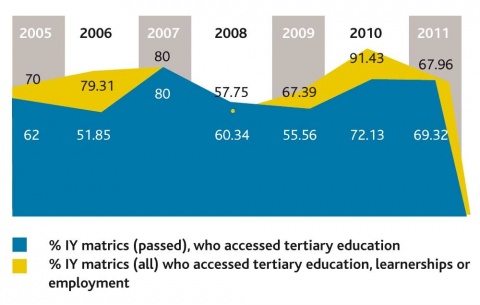
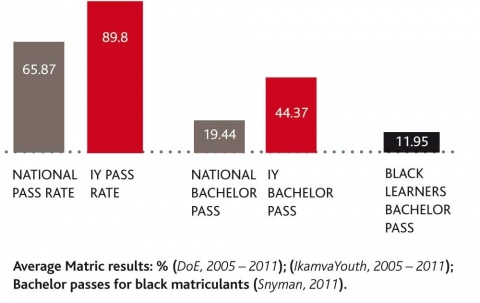
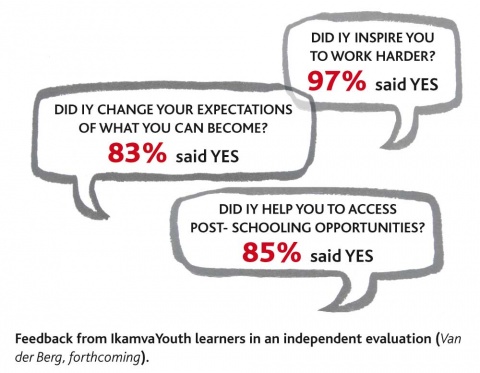

































 Lloyd Lungu
Lloyd Lungu